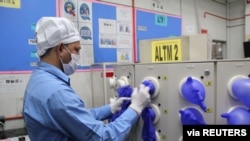Malaysia, the world's top rubber glove maker, is apparently relaxing a partial lockdown of the country so that factories can return to full staffing and help fend off a global shortage of the critical protective gear for health care workers battling the coronavirus pandemic.
Malaysian glove makers warned last month of a global shortage because of the lockdown.
However, according to a March 27 letter to its members from the Malaysia Rubber Glove Manufacturers Association, the Ministry of International Trade and Industry gave way late last month at a meeting with the association, allowing glove factories to return to full staffing as of April 1.
The ministry would not comment on the report.
The association said in its letter that companies still had to apply to the ministry with a complete list of their workers and then stagger their shifts to keep the factories as thinly staffed at any one time as possible. On the condition that they stick to those rules, the letter said, "MITI has agreed ... that the companies who have received approval to operate at 50% labor usage can now operate with 100% labor force."
Association president Denis Low told VOA the ministry had agreed to let the glove factories operate at "optimum," but would not discuss specific staffing levels, concerned that might encourage other industries to press the government for similar privileges.
"I would say that the government has given us the opportunity to work at optimum, and by optimum we mean to say that we will be able to supply the 225 billion pieces of gloves which we think the world will need this year," he said.
The factories churned out 187 billion gloves in 2019.
If true, the move could have a significant impact on the global coronavirus outbreak.
Govindasamy Baskaran, managing director of one of Malaysia's largest glove companies, Brightway, said the "skyrocketing" use of gloves in the wake of the coronavirus pandemic meant that some of his international customers were running out of stock already.
"So, I think ... it's a very valid reason to have given the [approval for] 100% operations, without which I am sure there would be a big shortage," he said.
"Already there is a shortage everywhere, and there have been cases where ... the frontliners are working without gloves."
Baskaran said his factories were back at full staff by April 3.
Jeremy Lim, co-director of global health at the National University of Singapore's Saw Swee Hock School of Public Health, struck a similar chord.
"It will certainly help to alleviate the global shortage tremendously, given Malaysia's market dominance in this," he said.
The health care industry expert said most governments and hospitals will have stockpiles of gloves and other essential protective gear for their doctors and nurses.
"But if this crisis goes on for long enough, definitely everyone will start to feel the pain." said Lim. As the world's top glove maker, Malaysia's move to let the factories run at full tilt "will be very, very important," he added.
The European Union had raised its own concerns with Malaysia's staffing limits just days before the government apparently agreed to give the glove factories a pass, and expressed support for the apparent decision to ease the lockdown.
In a March 25 letter to International Trade and Industry Minister Azmin Ali, EU Ambassador to Malaysia Maria Castillo Fernandez said gloves were among the most difficult items to source and that the country's partial lockdown was hobbling global supplies.
On Thursday Castillo Fernandez told VOA that the EU welcomed Malaysia's move to let the country's glove factories boost production.
"We support the Malaysian government’s decision to allow essential goods manufacturers and their supply chains involved in the production of vital medical equipment to operate at needed capacity to meet the urgent global demand for these medical supplies.” she said.
“Malaysia is the world's largest producer of medical exam gloves, and as such it plays a very important role by contributing to avoid a shortage of this essential medical equipment, for Malaysia, for the EU and for the whole world," she added.




